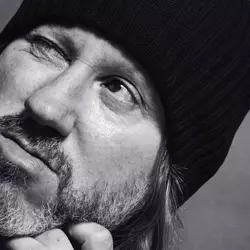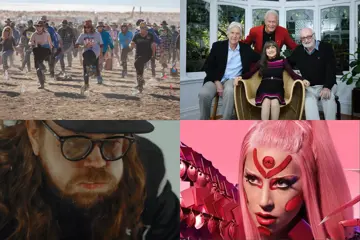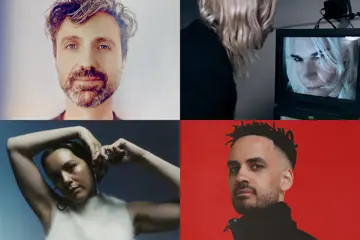 Badly Drawn Boy
Badly Drawn BoyBadly Drawn Boy plays the Tivoli Theatre on March 18.
From his first series of sequential EPs to his first album The Hour Of Bewilderbeast, beanie-clad boho Brit Damon Gough, a.k.a. Badly Drawn Boy, was coming straight outta the bedroom, using his high-profile many-zeroes contract from dance giants XL to spend years buried away, piecing songs together like postmodernist collages.
Since Bewilderbeast copped a promo buzz and Gough —with said knit-cap and expensive promo-videos and smart-ass ways all working for him— ascending to some state of minor-league celebrity/major-league songsmith, his bunkered down and taken a more traditional songwriter’s path. Cutting his soundtrack to About A Boy and his latest album, Have You Fed The Fish?, which were both issued last year, in quick succession in the Los Angeles studios of producer Tom Rothrock, Gough’s been doing a passable impression of a cross-channel counter to yankee white-suit clad crooner Elliott Smith, his discs dishing up daggy 70s-soft-rock numbers, instrumentalist English fancy, stately orchestral-pop pomp, and touching acoustic odes. And, like, now, he’s touching down for his first Australian tour.
“I got this crappy old keyboard in about 1982, when I was about 12 years old, but I think I only saw it as an electronic-gadget, like a toy,” says Gough, genially, via the telephone, in anticipation of said first-Australian-tour, of his start in the music-making. “You could play melodies on it, and make a copy of those melodies at the same time, y’know, one of those first little Casios that used a sampler. I was just intrigued, as young boys are, with little gadgets and electronics. I did enjoy the music side of it, like trying to work out how to play Don’t You Want Me by The Human League or something, and I think that was the first early learning, for me, of how music works. Like how a bassline influences the melody, and the way chord-progressions change what happen what happens over them, things like that. That was how it all started, but, certainly, there was no ambition at that point.”
Further down the line, Gaugh continues, “in my late teens, I was working in record-studios, and at that point I wanted to be a sound-engineer. I was more intrigued with the behind-the-scenes work, of how a record gets made, or what recording actually is - the physicality of storing information on a tape - than I was with making music itself. Once I spent a couple of years doing that, and I didn’t find that foot-in-the-door I thought I would, I lost interest. I thought it was going to be my professional career, but it didn’t end up that way. In the meantime, I’d started to pick up a guitar, so the two went hand in hand. I spent most of my early 20s recording myself playing songs, as just a hobby really; but over the next five years it became a sort of extended hobby.”
Don't miss a beat with our FREE daily newsletter
Even as the hobby extend itself, then progressed into viable career option, into his craft, into the slightly self-conscious situation of knowing that thousands upon thousands of people will hear his hobbyist songs (a thought which, Gough says, is one of the ideas at play on Have You Fed The Fish?), Gough doesn’t feel like he’s learned much; and is keen to keep things as simple as possible.
“I’m sure if I got myself a computer I could put together a great techno record or a dance record in about a week, but my personal challenge for myself is to stick with the guitar, and to write a song how people used to have to do, before this new rise of music technology. I’m not saying I’ll always do it that way, and I don’t get a thrill out of doing it the hard way, it’s old for me. But, the relationship I have with my guitar is the most prominent one I’ve got, in terms of making music. And that’s what I get a buzz out of, that the guitar is just sitting there, waiting for me to make music with it, that the next song is just waiting there.”
He continues: “I don’t think anything I’ve learned has changed my approach. I’m basically the same person as I was when I first picked up the guitar. I can say that with all honesty, because, when I go back into my room after this interview, I have no idea what I’m gonna play, and I have no real knowledge of how the guitar works. I’ve accumulated a little bit more knowledge —I now know several chords, I now know how to put a song together— but that doesn’t make you write better songs. Those days when the good songs come, you’ve just gotta be in tune at the right moment, and rely on a bit of luck, and your head’s gotta be in the right space. I could spend a whole week and write 20 songs, and they’d all be useless, but then the next day I might write 10 songs, and they might all be great. There’s a lot of guesswork, and, sometimes, there’s a lot of work waiting for that next song, the song you think is beautiful and that you’d like people to hear. If it takes a lot of work to get to that one good song, that’s what you’ve got to do.”
















